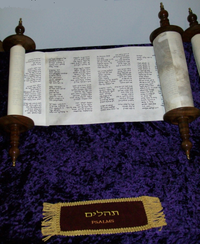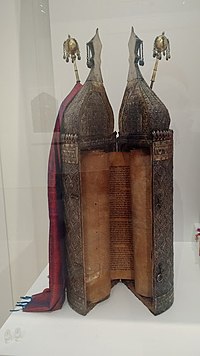| Part of a series on |
| Islam |
|---|
 |
| Beliefs |
| Practices |
| History |
| Culture and society |
| Related topics |
Islamic holy books are certain religious scriptures that are viewed by Muslims as having valid divine significance, in that they were authored by God (Allah) through a variety of prophets and messengers, including those who predate the Quran. Among the group of religious texts considered to be valid revelations, the three that are mentioned by name in the Quran are the Tawrat (Arabic for Torah), received by prophets and messengers amongst the Israelites; the Zabur (Psalms), received by David; and the Injeel (Arabic for the Gospel), received by Jesus. Additionally, the Quran mentions God's revealing of the Scrolls of Abraham and the Scrolls of Moses.



Muslims hold the Quran, as it was revealed to Muhammad, to be God's final revelation to mankind, and therefore a completion and confirmation of previous scriptures, such as the Bible. Despite the primacy that Muslims place upon the Quran in this context, belief in the validity of earlier Abrahamic scriptures is one of the six Islamic articles of faith. However, for most self-identified Muslims, the level of this belief is restricted by the concept of tahrif.
The Islamic methodology of tafsir al-Qur'an bi-l-Kitab (Arabic: تفسير القرآن بالكتاب) refers to interpreting the Qur'an with/through the Bible. This approach adopts canonical Arabic versions of the Bible, including the Tawrat and the Injil, both to illuminate and to add exegetical depth to the reading of the Qur'an. Notable Muslim mufassirun (commentators) of the Bible and Qur'an who weaved biblical texts together with Qur'anic ones include Abu al-Hakam Abd al-Salam bin al-Isbili of al-Andalus and Ibrahim bin Umar bin Hasan al-Biqa'i.
Major books
Quran
Main article: QuranThe Quran is the central religious text of Islam, which Muslims believe to be a revelation from God (Arabic: الله, Allah). The Quran is divided into chapters (surah), which are then divided into verses (ayah). Muslims believe the Quran was verbally revealed by Allah to Muhammad through the angel Gabriel (Jibril), gradually over a period of approximately 23 years, starting in late 609, when Muhammad was 39, and concluding in 632, the year of his death. Muslims regard the Quran as the most important miracle of Muhammad, a proof of his prophethood, and the culmination of a series of divine messages that started with the messages revealed to Adam and ended with Muhammad. It is widely regarded as the finest work in classical Arabic literature.
Tawrat (Torah)
Main article: Torah in IslamThe "Tawrat" (also Tawrah or Taurat; Arabic: توراة) is the Arabic name for the Torah within its context as an Islamic holy book believed by Muslims to have been given by God to the prophets and messengers amongst the Children of Israel. When referring to traditions from the Tawrat, Muslims have not only identified it with the Pentateuch, but also with the other books of the Hebrew Bible as well as with Talmudic and Midrashim writings.
Zabur (Psalms)
Main article: ZaburThe Quran mentions the Zabur, interpreted as being the Book of Psalms, as being the holy scripture revealed to King David (Dawud). Scholars have often understood the Psalms to have been holy songs of praise, and not a book administering law. The current Psalms are still praised by many Muslim scholars. Quran 21:105 and Psalm 37:29 are direct counterparts.
Injil (Gospel)
Main article: Gospel in IslamThe Injil was the holy book revealed to Jesus (Isa), according to the Quran. Most scholars and Muslims believe that it refers not to the New Testament but to an original Gospel given to Jesus as the word of Allah.
Additional scriptures
The Quran also mentions two ancient scrolls:
Scrolls of Abraham
The Scrolls of Abraham (Arabic: صحف إبراهيم, Ṣuḥuf ʾIbrāhīm) are believed to have been one of the earliest bodies of scripture, which were given to Abraham (Ibrāhīm), and later used by Ishmael (Ismā‘īl) and Isaac (Isḥāq). Although usually referred to as "scrolls", many translators have translated the Arabic suhuf as "books". The verse mentioning the "Scriptures" is in Quran 87:18-19 where they are referred to, alongside the Scrolls of Moses, to have been "Books of Earlier Revelation".
Scrolls of Moses
The Scrolls of Moses (Arabic: صُحُفِ مُوسَىٰ, Ṣuḥuf Mūsā) are an ancient body of scripture mentioned twice in the Quran. They are part of the religious scriptures of Islam. Jordanian scholar and professor of philosophy Ghazi bin Muhammad mentions that the "Scrolls of Moses" are identical to the Torah of Moses. Others have stated that they could possibly refer to the Book of the Wars of the Lord, a lost text spoken of in the Old Testament or Tanakh in the Book of Numbers. The verse mentioning the "Scriptures" is in Quran 87:18-19 where they are referred to, alongside the Scrolls of Abraham, to have been "Books of Earlier Revelation".
Words of Adam
Additionally, in the Quran are mentioned words of guidance revealed to Adam (Surah 2:37).
See also
- Biblical and Quranic narratives
- Canonization of Islamic scripture
- List of Islamic texts
- List of Shia books
- Prophets and messengers in Islam
- Sunnah
References
- Glasse, Cyril. "Holy Books". Concise Encyclopedia of Islam.
- ^ McCoy, R. Michael (2021-09-08). Interpreting the Qurʾān with the Bible (Tafsīr al-Qurʾān bi-l-Kitāb). Brill. ISBN 978-90-04-46682-1.
- ^ Nasr, Seyyed Hossein (2007). "Qurʼān". Encyclopædia Britannica Online. Retrieved 2007-11-04.
- Lambert, Gray (2013). The Leaders Are Coming!. WestBow Press. p. 287. ISBN 9781449760137.
- Roy H. Williams; Michael R. Drew (2012). Pendulum: How Past Generations Shape Our Present and Predict Our Future. Vanguard Press. p. 143. ISBN 9781593157067.
- Living Religions: An Encyclopaedia of the World's Faiths, Mary Pat Fisher, 1997, page 338, I.B. Tauris Publishers.
- Quran 17:106
- Peters, F.E. (2003). The Words and Will of Allah. Princeton University Press. pp. 12–13. ISBN 0-691-11461-7.
- Margot Patterson, Islam Considered: A Christian View, Liturgical Press, 2008 p.10.
- Mir Sajjad Ali, Zainab Rahman, Islam and Indian Muslims, Guan Publishing House 2010 p.24, citing N. J. Dawood's judgement.
- Alan Jones, The Koran, London 1994, ISBN 1842126091, opening page.
"Its outstanding literary merit should also be noted: it is by far, the finest work of Arabic prose in existence."
- Arthur Arberry, The Koran Interpreted, London 1956, ISBN 0684825074, p. 191.
"It may be affirmed that within the literature of the Arabs, wide and fecund as it is both in poetry and in elevated prose, there is nothing to compare with it."
- Isabel Lang Intertextualität als hermeneutischer Zugang zur Auslegung des Korans: Eine Betrachtung am Beispiel der Verwendung von Israiliyyat in der Rezeption der Davidserzählung in Sure 38: 21-25 Logos Verlag Berlin GmbH, 31.12.2015 ISBN 9783832541514 p. 98 (German)
- "Zabur - Oxford Islamic Studies Online". www.oxfordislamicstudies.com. Archived from the original on July 26, 2018. Retrieved 2018-07-26.
- Encyclopaedia of Islam, Psalms
- Martin Lings, Mecca; Abdul Malik, In Thy Seed.
- "Psalms - Oxford Islamic Studies Online". www.oxfordislamicstudies.com. Archived from the original on July 26, 2018. Retrieved 2018-07-26.
- Ali, Abdullah Yusuf (1938). The Holy Qur-an.
- Alternatives: Arabic: صُحُفِ إِبْرَاهِيم Ṣuḥufi ʾIbrāhīm and/or الصُّحُفِ ٱلْأُولَىٰ Aṣ-Ṣuḥufi 'l-Ūlā - "Books of the Earliest Revelation"
- Quran 87:19
- ^ Abdullah Yusuf Ali, The Holy Qur'an: Text, Translation and Commentary
- Marmaduke Pickthall, The Meaning of the Glorious Koran
- A Thinking Person's Guide to Islam: The Essence of Islam in 12 Verses from the Qur'an. 2018. ISBN 9781906949648.
- Numbers 21:14
| People and things in the Quran | |||||||||||||||||||||||||||||||||||||||||||||||||||||||||||||||||||||||||||||
|---|---|---|---|---|---|---|---|---|---|---|---|---|---|---|---|---|---|---|---|---|---|---|---|---|---|---|---|---|---|---|---|---|---|---|---|---|---|---|---|---|---|---|---|---|---|---|---|---|---|---|---|---|---|---|---|---|---|---|---|---|---|---|---|---|---|---|---|---|---|---|---|---|---|---|---|---|---|
| |||||||||||||||||||||||||||||||||||||||||||||||||||||||||||||||||||||||||||||
| |||||||||||||||||||||||||||||||||||||||||||||||||||||||||||||||||||||||||||||
| |||||||||||||||||||||||||||||||||||||||||||||||||||||||||||||||||||||||||||||
| |||||||||||||||||||||||||||||||||||||||||||||||||||||||||||||||||||||||||||||
| Note: Names are sorted alphabetically. Standard form: Islamic name / Biblical name (title or relationship) | |||||||||||||||||||||||||||||||||||||||||||||||||||||||||||||||||||||||||||||